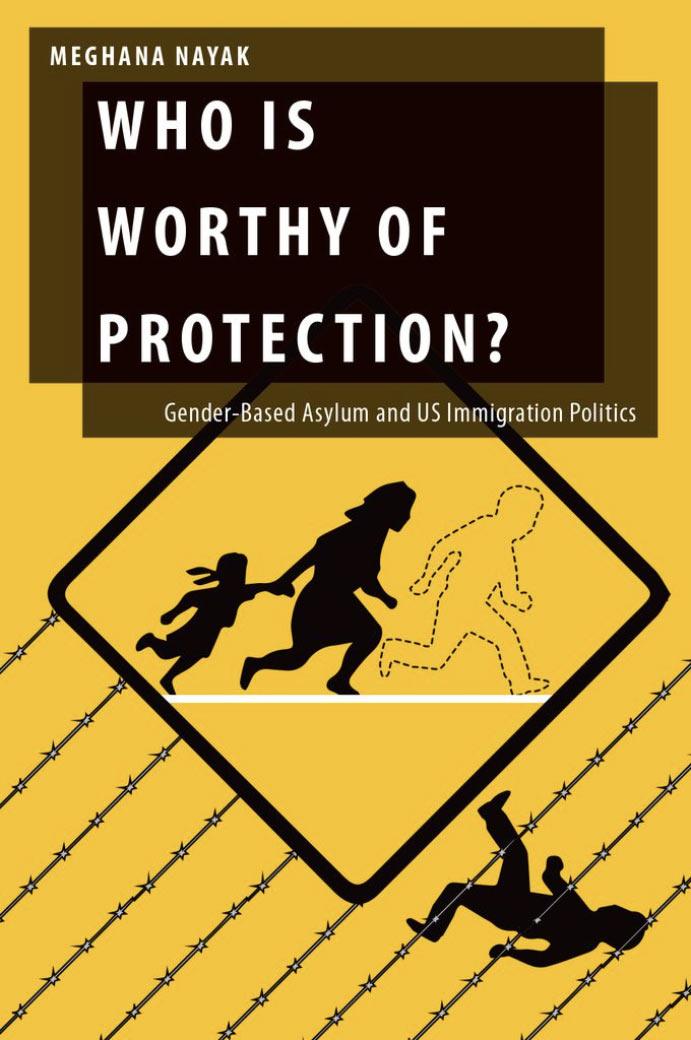

Who Is Worthy Of Protection? Gender-Based Asylum And U.S. Immigration Politics
Meghana Nayak, PhD
Associate Professor Political Science, NYC

When did you join Dyson?
I started at Pace in August 2003.
What motivates you as an educator?
Seeing my students believe in themselves, sometimes for the first time.
What do you do in your spare time to relax/unwind?
Play with our puppy, piano, art, yoga, cooking.
What are you reading now?
Corbett's A Murder Over a Girl: Justice, Gender, Junior High; Yanagihara's A Little Life.
What is the main plot or central theme of your book?
A surprisingly understudied topic in international relations is gender-based asylum. Gender-based asylum offers protection from deportation for migrants who have suffered gender violence and persecution in their home countries. However, it matters not just THAT but HOW we respond to gender violence and persecution. Those applying for asylum have to use "frames" and "narratives" to make their claims of persecution believable. As a result, these frames often leave out or distort the stories and experiences of asylum seekers who do not fit preconceived narratives of "good" victims who "should" receive asylum. The book challenges and complicates the idea that some migrants are more "worthy" of protection than others.
What inspired you to write this book?
I have been following gender-based asylum cases since graduate school. While an increasing number of scholars have investigated these unique cases, I found that the issue was not fully situated within global politics, or how countries like the U.S. use categorizations of migrants to their own advantage.
Why is this book important in your field? What does it contribute to the current body of knowledge on its topic?
This is the first book in the field of international relations to address gender-based asylum and to connect policies around asylum to not only the impact on asylum seekers but also to how the U.S. uses these policies in politically expedient ways when it interacts with other countries. For example, asylum policies regarding trafficking not only impact trafficking survivors trying to get asylum but also shape the U.S.'s stance that anti-trafficking policies should include anti-prostitution policies. In turn, the U.S. tries to influence other countries to adopt the same policies. So these policies matter far beyond the impact on individual asylum seekers. The book also provides several pragmatic suggestions to better interact with the asylum system and thus connect theory and practice.
Were students involved in any research related to your book?
Yes, Jessie Meredith (POL/PJS 2016; Fulbright Scholar) was a research assistant under the auspices of the Provost Undergraduate Faculty Student Research Grant, and several former students read my manuscript (including Katelyn James, Whitney Macdonald, Alejandra Lopez, and Annamaria Santamaria). Finally, my student Klaudia Remiszewska designed the cover!
Tell me about a particularly special moment in writing this book.
The support I received from loved ones–they truly understood what a long process it is to write a book.
What is the one thing you hope readers take away from your book?
I hope readers start to think about how we label and classify people, particularly so-called "outsiders." Are some people really more worthy of being protected from violence than others? I don't think so, but that is how policies play out when distinctions are made between people. For example, someone who was trafficked into the country might be considered more vulnerable than someone who paid a smuggler to get into the country. But from a human rights perspective, this selective approach can be very harmful.
Is there anything else you would like to share about your book?
I hope people feel free to contact me after reading the book to talk about it, ask questions, or challenge my analysis. More importantly, I hope that we are all more attentive to the struggles so many face as they grapple with unsettled legal statuses.